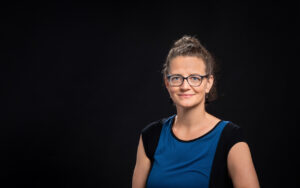Graduate Student Spotlight: Gitte Frandsen

PhD Student in Public Rhetorics and Community Engagement
My research focuses on building spaces in higher education that welcome and validate the linguistic, cultural, and knowledge-making practices of traditionally marginalized and underrepresented students. My starting point is the acknowledgement that higher education, broadly, and English programs, specifically, engage in exclusionary practices that uphold barriers for many undergraduate and graduate students. These practices include the centering of rhetorical styles and knowledge systems of white, middle- and upper-class students, and norms and expectations for academic writing which privilege the writing and linguistic resources of white, middle- and upper-class students.
One set of research questions I explore is how writing programs and writing pedagogy can leverage the resources of linguistically and culturally diverse undergraduate students. Recognizing that access to multiple languages and language varieties is an asset for students rather than a hindrance for their learning of academic writing and research, I ask how writing classrooms can make space for difference from narrowly-defined norms of academic language and writing. Further, I ask how writing classrooms can learn from multilingual and multidialectal students’ communication practices to enhance the rhetorical dexterity and multiliteracies of all writing students.
Another related set of questions I explore focuses on the experiences of graduate students as they navigate through academic spaces. A study by the research team I am part of shows that many graduate students at UWM are deeply anxious about not belonging in graduate school, feeling that they lack the cultural capital and language skills that are expected of them. I ask how graduate programs can become more inclusive of non-traditional students such as those who identify as non-white, working-class, first-generation, and transnational students. For example, graduate students who are also GTAs experience that the linguistically and culturally just pedagogies they have adopted are not present in their graduate classes. How can graduate programs include the diverse knowledges, experiences, and language practices that graduate students bring to their programs rather than expect the students to assimilate to a set of narrowly-defined norms?
My research engages with communities at multiple levels: it seeks to sustain communities of undergraduate and graduate students on campus by visibilizing and validating the community knowledges and literacies these students bring to higher education. I believe this move will enrich our classrooms; create more just pedagogies and assessment practices; and more inclusive research. Further, I want my research to engage not only teacher scholars but also other stakeholders and publics in order to widen the scope of the conversation about what social justice in higher education can be.